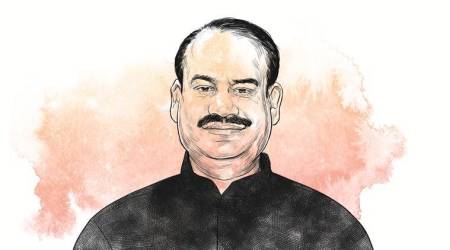How France emerged from Champagne Football’s shadow: ‘Winning our identity’
BEFORE FRANCE’S World Cup quarterfinal against England last week, a French journalist asked manager Didier Deschamps, somewhat agitatedly: “What is our identity?” He dragged on: “Where is our identity? Do we have any?” Deschamps, taking a deep breath, betraying no signs of frustration, replied calmly: “Winning is our identity.” The room crackled with laughter.
It’s an answer Deschamps has produced and reproduced a thousand times.
The French might be winning the World Cup again — they beat Morocco 2-0 in the semifinal and will meet Lionel Messi’s Argentina in the final on Sunday. They could also become just the second side after World War-II to defend the World Cup crown. But the French media are unsatisfied with just winning.
The lament is they don’t play Champagne Football, a phrase that contains all the grace and grandeur of French football — a philosophy forged by the “Godfather” of French football managers, Albert Batteux, whose favourite author was the existentialist writer Albert Camus but whose game was forged in the ideals of playing “in the most beautiful way”.
From a host of French managers who idolised Batteux, the Euro 1984-winning Michel Hidalgo explained the traits of Champagne Football: “A short game, played with vivacity and technique. It was sparkling football. Everything was done with quality of play in mind, for the sake of having the ball at your feet and attacking. It should be the way French football should always be played.”
Just days before France embarked on their World Cup defence mission, the newspaper “L’Equipe” lamented: “The French have no identity, and the French team losing could be a blessing in disguise.” The implication was clear: If Deschamps stuttered, he could be axed and a new manager, preferably Zinedine Zidane, the monument of Champagne Football, could restore the lost identity.
The French are obsessed with aesthetics and elegance. The dissatisfaction among critics is that despite the gilt-edge potential, despite the attacking prowess, they are still knee-deep in pragmatism. There are moments when they flutter the wings, bursts when they uncork Champagne Football — both Kylian Mbappe and Antoine Griezmann — but fundamentally they are a defensive-minded side.
But dig deeper into Deschamps’s France, you do unearth identity. Maybe, not as profound as Spain’s Tiki Taka or as beautiful as the Dutch Total Football or as energetic as Germany’s Gegenpress, but an identity that is not rooted in the brand of football they display, but in the virtues they shed.
In their steeliness and ruthlessness, pragmatism and togetherness, in their structural and defensive discipline, in their monkish calm under pressure, in their ability to seize half an opportunity. They might not have played like a World Champion side, but they have shown the characteristics of one. You can call this the Deschampian identity.
In the build-up to the tournament, France lost nearly half their first-choice eleven; in the 10th minute of the first game, they lost their regular left-back; the day before the semifinal, their trusted centre-back and midfielder caught a bug. That they recovered from their setbacks is as much a testament of their dizzying depth of talent as a statement of their ruthless mentality. Deschamps has built a team that wants to win and knows how to win.
To expand on their identity and virtues, it’s worth revisiting what happened on November 22. In the afternoon, Saudi Arabia pulled off the upset of the tournament, beating Argentina. A few hours later, France were trailing 1-0 to Australia. For the first 20 minutes, the French were abysmal, losing possession, defending clumsily and not producing anything melodic or meaningful. But they didn’t freeze, they didn’t panic. They soaked the pressure, took time to settle down, as though they were leading, slowed the game down and then when order was restored, regenerated into a fire-spitting dragon that devoured the Australians.
The theme was to recur throughout the tournament. Against both England and Morocco, there were moments when they were genuinely the second best team, when they seemed racked and ragged. But they didn’t look frazzled, or flustered. Even when England equalised and buzzed and bustled, they did not wither.
Argentina ? France
The #FIFAWorldCup Final is SET! ????
— FIFA World Cup (@FIFAWorldCup) December 14, 2022
The French defence is where their togetherness shines the brightest. Apart from Kylian Mbappe, and at times Ousmane Dembele, the rest fall back. With his physicality, Olivier Giroud is an intimidating presence even in his own box. Often, it is he who clears the headers during corners or hoofs away the second ball. You could spot the twinkle-toed Griezmann imparting the subtlest of touches to deflect the ball off an attacker’s feet. “We defend like a family,” defender Raphael Varane would say, laughing.
Against both England and Morocco, they had less possession than the opponents, fewer passes and fewer touches in the opposition’s penalty box. Yet, they scored more goals. Against Morocco, they could have scored more goals but for sloppy finishing and the post. All the four goals in these two games originated from pure anticipation and drive, the drive to reach the ball quicker than the opponent, the anticipation that the ball could deflect or rebound into the path.
The goals against Morocco were instructive. Particularly the first one, when Theo Hernandez made a darting run down the left. He could have stopped when he saw that the ball was on Mbappe’s feet, but he lingered, cut infield, and when the ball bounced in front of him, showed immaculate technique to blast it home.
Subscriber Only Stories
 Premium
Premium Premium
Premium Premium
Premium Premium
PremiumThat was Champagne Football. There were other moments in the tournament too — every goal of Mbappe, for instance. But Deschamps has the wisdom to realise that playing Champagne Football alone would not lead to champagne uncorking moments.